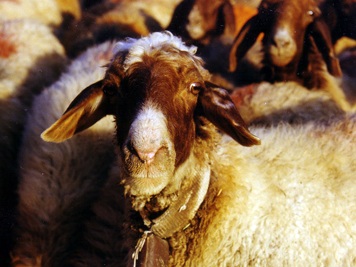
No other animal is as distinguished and prized in the ancient Near East as the sheep. It is one of the earliest domesticated animal in the ancient Near East, and the simplest indicator of one's wealth and power. It is also the most frequently mentioned animal in the Bible; taking the various forms of its representation—sheep, rams, ewes, and lamb, both literal and metaphorical—it is referred to more than 670 times.
Before we enter into any discussion about the animal, it is important that we replace the picture of the sheep we are dealing with in our imagination. When sheep is mentioned, the picture most of us have in our conception of the sheep looks like this:

Sheep on an English farm
Within the context of our discussion below, you should replace it with this picture in your conception:

Sheep near the Valley of Jezreel, the real MaCoy.
Sheep provided milk and meat, especially for important feasts (1 Ki 1:9; honoured guests get rather the "fatted calf" instead, Gen 18:7; 1 Sam 28:24; Lk 15:23); Solomon's court consumed 100 sheep and goats every day (1 Ki 4:23). Their wool were weaved and sewn into clothings and tents, and their skins as rugs and coats. They were the central agent in Israel's worship and fellowship with God. Isaac was spared from being sacrificed by Abram by God's provision of a ram (Gen 22:13). While the many rituals and offerings detailed in the books of Exodus, Leviticus and Numbers, are multifaceted and nuanced in their significance and applications, the sheep, lamb, and ram, occupy an important place in many of them. The first feast, the Passover, was instituted by the slaughtering and consumption of a lamb, one for each household (Exo 12:3), and the ram, a male sheep, remains the only acceptable guilt offering. At the dedication of the temple, 20,000 sheep and goats were sacrificed as fellowship offerings to the Lord (1 Ki 8:63). Also, every firstborn lamb belonged to Yahweh (Exo 13:12; Deut 15:19).
It is interesting that, though the sheep would become the principal element of Israel's life, the sheep is not mentioned in the Bible until Abram's journey into Egypt, passed off his wife Sarai as his sister, incurred the displeasure of the pharaoh, who out of fear, rewarded him with "" sheep and cattle, male and female donkeys, menservants and maidservants, and camels" (Gen 12:16). Afterwards Abram's descendants would always be associated with the flock, we do not know what was Abram's occupation before this.
It is little surprising, given the place of the sheep in their lives, that the sheep, and the shepherd, should find their way easily into the metaphorical and poetic arenas. Many will find it difficult to appreciate the praise of the lover for his beloved when he acclaims, "Your teeth are like a flock of sheep just shorn, coming up from the washing. Each has its twin; not one of them is alone" (Song 4:2; 6:6). Easier on our understanding, and more comforting, is the comparision of the people of God as sheep, either cared for by a good shepherd (Num 27:16-17; Psm 74:1; 78:52; 79:13; 100:3; Matt 15:24), or lost and disorientated by the lack or loss of one (1 Ki 22:17; Isa 13:14; Matt 26:31). So are those who are innocent compared to sheep (1 Chron 21:17), as are those who have gone astray (Isa 53:6; Jer 50:6), those who could only remain silent when oppressed and afflicted (Isa 53:7), or those who are harassed and helpless (Matt 9:36). But, for those of us who are pastors and teachers of the word of God, there is Jesus' command to Simon son of John, "Take care of my sheep" (Jn 21:16-17). Reading this article and not owning our Saviour's call to do so similarly would be a royal moral failure indeed!
You may also be interested in reading about what it means to be a Shepherd.

©ALBERITH
170116lch